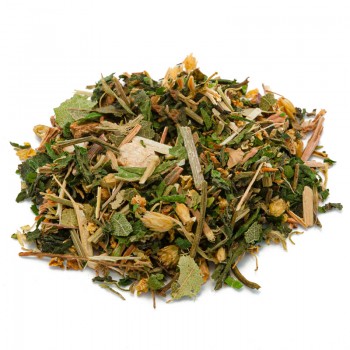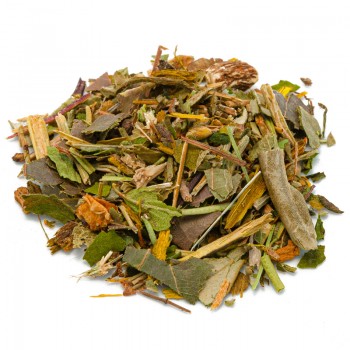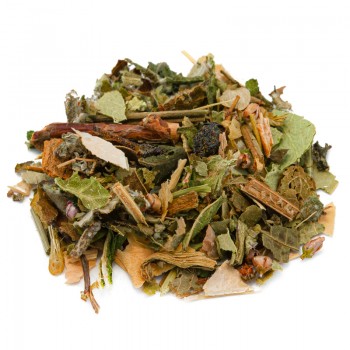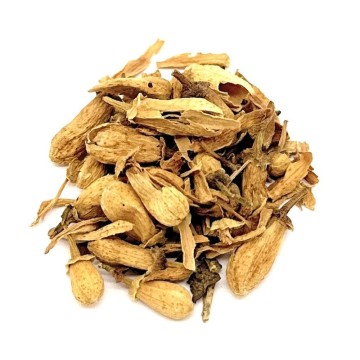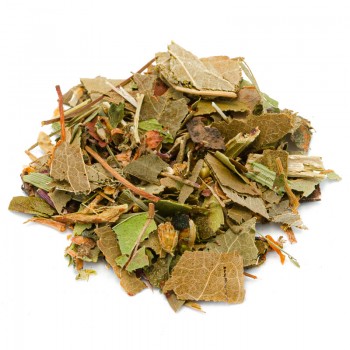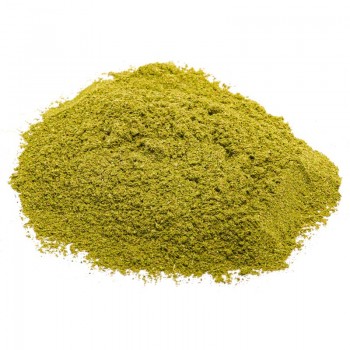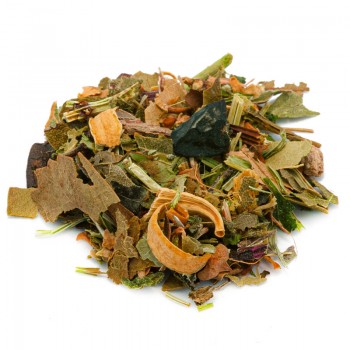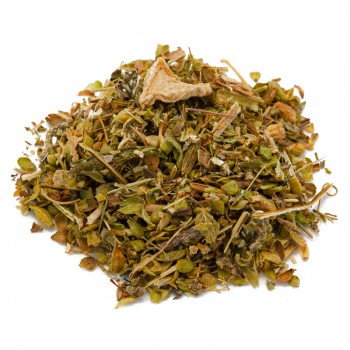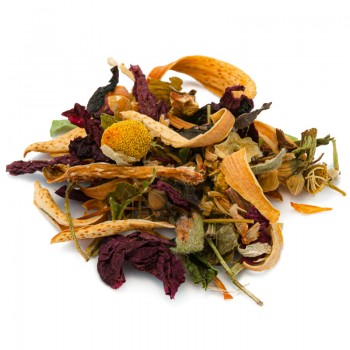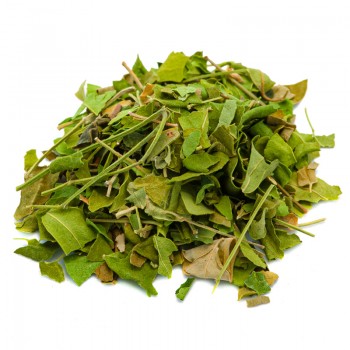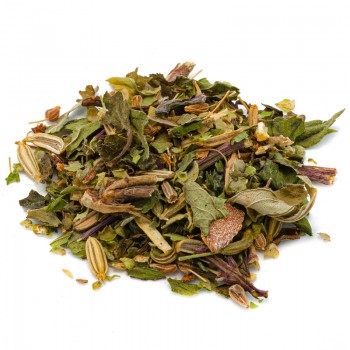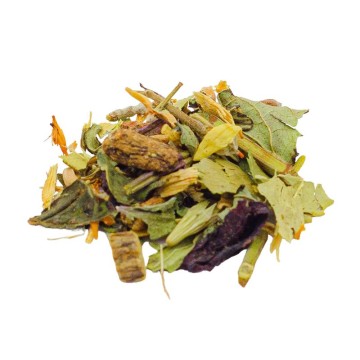This combination is designed to deliver a complex and authentic flavor on the palate, rich in bold nuances.
It contains a blend of aromatic leaves and herbs, roots, flowers, and fruits that restore the authenticity of natural herbal teas. The taste experience transitions from bitter and balsamic notes to floral and sweeter flavors. The main aromas of loosestrife, cinchona, and chicory are intense and refined, providing a deep structure, which is lightened by the fresh and aromatic herbaceous notes of rosemary, pellitory of the wall, and juniper.
The complexity of this blend also includes sweet and spicy nuances from fennel, licorice, and angelica, intertwined with floral notes of lady's mantle and chamomile, which are perceived in the final taste. An aromatic infusion, perfect for a wellness break with a natural flavor, ideal as an after-meal herbal tea due to its pleasantly bitter taste.
Plants and Flowers
The Salicaria-based blend contains several plants that have been used for centuries to make aromatic and light after-meal herbal teas. Most medicinal herbs have been present in Europe since time immemorial, and today all the ingredients are available dried and ready for infusion.
Lythrum salicaria is a flowering plant belonging to the Lythraceae family. This herbaceous perennial is native to Europe and Asia, and possibly Australia. It grows to about 1.5 meters tall, with an erect stem, curled leaves, and pink flowers; It is covered with fine reddish hairs.
Lady's mantle, or Alchemilla vulgaris, is a perennial plant belonging to the large Rosaceae family. It grows wild in central and western Europe, particularly in mountain forests and meadows. The stem is tall, the leaves are palmate and toothed, and the flowers are summer flowers.
The Elecampane plant (Inula helenium) belongs to the Helenium species. It is native to Central Asia but quickly spread to Europe for medicinal purposes. It grows preferably in uncultivated land, in woods, among ditches, and in grassy pastures.
Licorice, or Glycyrrhiza glabra, is part of the Fabaceae family. It is a perennial plant native to southwest Asia and the Mediterranean region. Its roots provide a sweet substance, glycyrrhizin. To grow, it requires deep, fertile, and moist soil. Matricaria chamomilla belongs to the Asteraceae family. It produces daisy-like, sweet-scented flowers, collected for medicinal purposes. It exists in two similar varieties: German chamomile (Matricaria recutita, or Chamomilla recutita) and Roman chamomile (Chamaemelum nobile).
Cinchona (Cinchona spp.) is one of 38 evergreen species in the Rubiaceae family. They range from small shrubs to large trees (up to 15 m), and the most commonly used part is the bark. The best-known species are Cinchona officinalis, Cinchona ledgeriana, and Cinchona succirubra.
Angelica archangelica is a plant belonging to the Apiaceae/Umbelliferae family, widespread in Europe. It grows wild in mountainous areas, woodlands, and humid terrain, reaching a height of up to 2 m. It features edible stems and roots, large leaves, and greenish-white flowers. Fennel, with the botanical name Foeniculum vulgare, is a plant in the Apiaceae (Umbelliferae) family. It originates from the Mediterranean coast, although today it is widespread in many parts of the world. It prefers arid soils, near the sea and on riverbanks.
The chicory plant, Cichorium intybus, is a perennial herb in the Asteraceae family. It grows to about 120 cm tall, displaying erect, almost leafless stems adorned with numerous light-blue flowers. It has a large, fleshy root and leaves known to be edible.
Parietaria is a plant of tropical origin and belongs to the Urticaceae family. Now widespread in Europe, it gets its name from its growth between walls, cracks in walls, and along roadsides. Up to 70 cm tall, it features a cylindrical stem, oval leaves, and small green flowers.
Dandelion (Taraxacum officinale) is a perennial plant in the Asteraceae family. Also known as dandelion or blowball, it grows wild in a variety of soils and climates. It produces yellow-orange flowers and edible leaves that grow at the base of the plant. Rosemary (Salvia rosmarinus) is a shrub in the Lamiaceae family. It is known for its culinary use; it blooms from autumn to spring, producing aromatic linear leaves, green on top and whitish underneath.
Juniper (Juniperus) is a genus of conifers containing over 50 species, part of the Cupressaceae family. The plant is highly adaptable and reaches up to 12 m in height, but is generally smaller; the berries take about 3 years to ripen. Hops or Humulus lupulus, is a species of perennial plant of the hop family.Cannabaceae. Native to Europe, western Asia, and North America, it is a climbing plant that produces new shoots in early spring and dies in autumn, with a cold-resistant rhizome.
How to use herbs for herbal tea
The infusion is made by adding about 3-5 grams of the Salicaria Composta blend to a cup (250 ml) of water at 100°C.
Let it steep for 8 to 10 minutes before drinking the herbal tea. Enjoy it plain, or sweeten it with a touch of honey for a smoother taste.
Loose Salicaria Herbal Blend: Side Effects and Contraindications
The blend is generally well tolerated for use in herbal teas, but it is recommended to avoid consumption if you are allergic or intolerant to any of the individual ingredients. It is advisable not to consume the herbal tea for prolonged periods and to follow the recommended doses. The herbal tea is not recommended for pregnant or breastfeeding women.

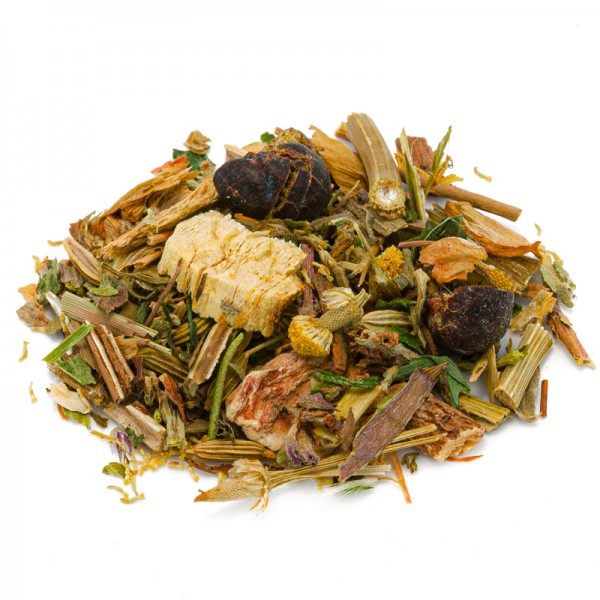







 No reward points for this product.
No reward points for this product.
